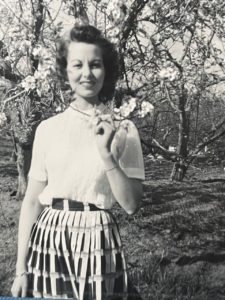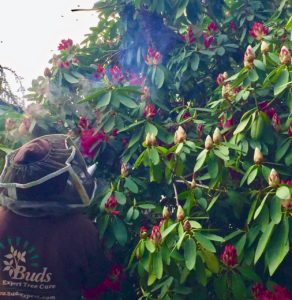While walking yesterday, I saw these mushrooms bubbling out beside the sidewalk and felt drawn to look more closely. They reminded me how important it is for a writer–or anyone, really—to remain aware of and sensitive to the world around you. That sensitivity can be painful at times but it also can bring moments like this: when something some would consider unsightly suddenly shines with strange beauty.
Category: Life
-

Coming Soon: An Essay on Goodness
Three months ago, in the midst of all of the post-election rancor, the editor of Notre Dame Magazine asked me what I would think about writing an essay on Goodness. He was tired of reading so much about the badness in the world, he said. I told him I’d take the project on but had no idea what I’d do with it. He seemed especially pleased at my not-knowing.
Given the times, with death and uncertainty, everywhere, nothing could have been better than spending the holiday period thinking about Goodness. The essay came to me in bits and pieces while I took long walks alone. I knew from the beginning I didn’t want to write some kind of traditional essay, but I didn’t expect the more lyrical piece I ended up creating: a meditation on what Goodness is.
The issue my essay will be in is at the printer’s now and will be mailed out to the magazine’s almost 200,000 subscribers sometime in the next 2-3 weeks. When it goes up online, I’ll post the link here.
Meanwhile, I encourage you to think about where Goodness appears in your own life. It’s a much better lens through which to see the world than the ones you find in most news outlets or social media.
-
Remembering My Mother’s Struggles and Beauty on Her 99th Birthday
 Today would have been my mother’s 99th birthday. A remarkable woman, she raised two children by herself on a bookkeeper’s salary. Once, when she asked her male boss for a much-needed raise, he told her raises were only for men, who had families to support.
Today would have been my mother’s 99th birthday. A remarkable woman, she raised two children by herself on a bookkeeper’s salary. Once, when she asked her male boss for a much-needed raise, he told her raises were only for men, who had families to support.I tell other stories about how she was treated by men and the strength she showed in dealing with them in the memoir I’m working on, which includes the days around her death.
Don’t worry, I tell stories about happier times and events too!
-
Bees in the City
Two days ago, I was doing a phone consultation with a writer who, among other things, was writing about bees. When I looked up from my notes, what did I see in our yard? A huge swarm of hundreds of…bees. I’ve never seen such a thing. It was strangely beautiful.
As I continued my consultation, the swarm lessened and eventually seemed to be down to a few dozen bees circling like electrons around an overgrown rhododendron. When I got off the phone, I went out to look closer and saw what is in the picture here: an upside down bee cone. It was two feet tall and just as wide at its widest part.
Fortunately, our neighbor used to have beehives and had the right equipment, as well as the desire to have one again. So last night he came and dropped the cone into a garbage bin and took the squirming mass off to put in one of his old bee boxes.
He missed a few, but over the past two days they’ve disappeared, so maybe they’re all together now.
Coincidentally, I’ve been reading Gabriel Garcia Marquez, in whose works the kind of coincidence in my first paragraph here happens all the time. Maybe more is at work in our world than we know.
Here a picture of the bees’ new home:
-
“Love in the Time of Cholera,” in the Time of Coronavirus

© Michael N. McGregor I started reading Gabriel Garcia Marquez’s Love in the Time of Cholera yesterday, as every writer should at some point during a pandemic. It is so beautifully rich in language and poignant and, what I didn’t expect, funny. Here are two lines from early in the book I thought especially evocative:
“In summer an invisible dust as harsh as red-hot chalk was blown into even the best-protected corners of the imagination by mad winds that took the roofs off the houses and carried away children through the air.”
and
“At nightfall, at the oppressive moment of transition, a storm of carnivorous mosquitoes rose out of the swamps, and a tender breath of human shit, warm and sad, stirred the certainty of death in the depths of one’s soul.”
Wow.
-
To Take What Is, In Both Hands

Sculpture by Gustav Vigeland (1869–1943)
photograph: © Michael N. McGregorI keep a copy of this poem/reflection by my writing desk. It seems more important now than ever (an English translation follows the German):
Zu Lebzeiten
by Jochen Mariss
Laß uns wieder lernen,
den Augenblick zu genießen,
zu nehmen, was ist,
mit beiden Händen,
hier und jetzt zu leben,
bevor wir das Leben verbracht haben
mit sorgenvollen Blicken in die Zukunft
und den Erinnerungen an die gute alte Zeit.In Life
by Jochen Mariss
Let us learn again
to enjoy the moment,
to take what is
in both hands,
to live here and now,
before we have spent our life
in anxious glances toward the future
and memories of the good old times.p.s. The photograph here is from Vigeland Sculpture Park in Oslo, Norway, and dedicated to those who are self-isolating with children. 🙃
-
Preparing To Be Free

Martin Luther King Jr. Memorial, Washington, DC
photo © Michael N. McGregorSTUDY that which you would like to see in this world—peace, truth, faithfulness, community, economic fairness, good government—and it will have a better chance of coming to be.
On this day of hope, let us all prepare our minds and hearts to work for a better world when we are free again.
Happy Easter to all!
-
FDR on a President’s Priorities in a Democracy

FDR Presidential Library & Museum photograph by Margaret Suckley [CC BY (https://creativecommons.org/licenses/by/2.0)] I haven’t added a new post to this site in a long time, and I’m not going to promise to be consistent about adding posts now. But I’ve started working on a new project, centered in the first decades of the 20th century, and some of what I’m reading for it is worth posting about because it relates to what we’re living through in the US today.
I’ll try to say more about what I mean by that in future entries, but for now, just to get started, I’m going to simply post a quote about FDR from a book published in 1937, when his policies were showing some signs of working but the Depression was far from over. The book deals primarily with his policy toward electricity and public utilities in general.
Here’s the quote:
“The President’s thinking goes first to government–democratic government–and after that to economics…In the prodigies of effort he put forth to lead the country out of the bogs of depression he therefore sought, and seeks still, more than what he has termed ‘a purposeless whirring of machinery.’ It is important that every man have a job, that every factory have orders to fill and that business as a whole earn profits. ‘But,’ as he said in his annual message to Congress in January, 1937, ‘government in a democratic nation does not exist solely, or even primarily, for that purpose.’ The factory wheels ‘must carry us in the direction of a greater satisfaction in life for the average man. The deeper purpose of democratic government is to assist as many of its citizens as possible–especially those who need it most–to improve their conditions of life, to retain all personal liberty which does not adversely affect their neighbors, and to pursue the happiness which comes with security and an opportunity for recreation and culture.’”
pp. 292-293, Pyramids of Power, M. L. Ramsay





